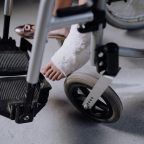
5 Scoliosis Facts You Should Know
You might have heard of scoliosis before, but you may not know that much about it unless you’re in the medical field. It’s actually pretty common, though, and if someone in your family has it, you should familiarize yourself with it, so you know what they’re experiencing. Let’s take a few moments to go over some scoliosis facts.
Doctors Find Millions of New Cases Every Year
3 million new cases of scoliosis are found in children every year. This means that if you've got a child who’s growing up, there’s a decent chance they might have the condition. Doctors usually diagnose scoliosis around ages 10-12, but they notice the symptoms even earlier in some cases.
It’s vital that doctors diagnose a child early. That’s because the earlier they notice the issue, the sooner they can talk with the child and their parents about treatment options.
A doctor will examine a child’s back and hips when they go for their yearly checkup. Back and hip misalignment can show a medical professional that a child might have this condition.
Surgery is Possible, But Not Always Necessary
If a doctor diagnoses a child with scoliosis, they will likely talk to the parents and child to try and ease their fears. They will probably talk about surgery with them, as there sometimes are surgical possibilities to help the afflicted individual.
However, most children and parents don’t opt for that. Obviously, no one wants to have surgery unless they feel there’s no better alternative, and only about 10% of those children with scoliosis end up having it.
Other kids might need leg braces or casts to correct the condition. About 30% of patients go with one of those options.
The other, much larger group needs no braces, casts, or surgery. The doctor might keep an eye on things to see how the child’s body keeps on developing, but they won’t interfere unless the patient is in pain or they’re having difficulty walking or moving.
No One Knows What Causes Scoliosis
Even though we know a lot more in the medical arena than we once did, doctors still don’t know exactly what causes scoliosis. There is no predicting what child is going to develop it, and there probably are no environmental factors that contribute to it.
There’s an old wives’ tale that heavy backpacks cause the condition, or others maintain that you develop it if your posture is bad. However, there is no real medical evidence that either of those ideas is true. Slouching as a child might cause you back pain further down the line, but it won’t give you scoliosis, nor will carrying a bookbag full of heavy textbooks.
Genetics Might Play a Role
Doctors mostly agree that genetics play a role in scoliosis. It’s always possible that a child might be the first one in the family to have it, but many doctors will look at other family members, both living and dead, to try and find others who had the condition.
Sometimes, a living or a deceased family member will have had it as well, but no doctor ever diagnosed it. This might happen if you have a medical practitioner who overlooked the condition, or perhaps you have an individual who did not see a doctor very much during their adolescence.
It Can Be Very Painful
While some mild scoliosis cases never need treatment, the worst ones do. That’s because when the spine curves and the individual takes no steps to treat it, it can start to hurt them quite badly.
The afflicted person may not be able to walk easily. They may not be able to play most sports, swim, bike, etc.
A doctor might recommend over-the-counter pain medication, yoga, or chiropractic adjustments. These are temporary solutions, though, and if the pain persists, that’s when the individual might need surgery or a brace.
It’s usually around puberty that a doctor will notice this condition, so if you have a child who’s around that age, make sure that a medical professional looks them over carefully if they complain of back pain or seem to be walking strangely. The sooner the diagnosis comes, the sooner you can start to figure out how to help this person.
Many people live with scoliosis, and if your child has it, it’s not the worst thing that could happen. Talk to them if they feel sad about it. You might even send them to see a therapist if they feel self-conscious or embarrassed.













